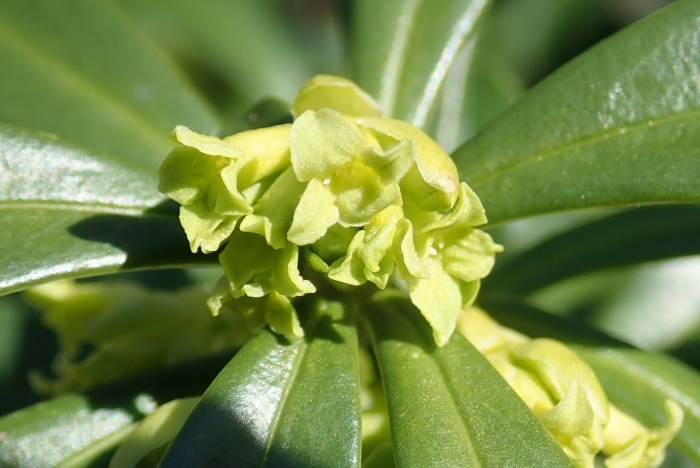Spurge-Laurel
(Daphne laureola)
Spurge-Laurel (Daphne laureola)
/
/

© Benoit NABHOLZ
CC BY-SA 4.0
Image By:
© Benoit NABHOLZ
Recorded By:
Copyright:
CC BY-SA 4.0
Copyright Notice:
Photo by: © Benoit NABHOLZ | License Type: CC BY-SA 4.0 | License URL: http://creativecommons.org/licenses/by-sa/4.0/ | Uploader: benoitnabholz | Publisher: iNaturalist |










Estimated Native Range
Summary
Daphne laureola, commonly known as spurge-laurel, is an evergreen shrub native to woodlands, scrub areas, and shaded hillsides in Europe, North Africa (Algeria and Morocco), and the Azores. It typically grows to a height of 2-5 feet and can have an upright or sprawling (decumbent) form. The foliage consists of dark green, glossy leaves that provide year-round interest. Yellowish-green flowers bloom early in spring and are modest in appearance, followed by black berries that are toxic to humans but provide a food source for birds. The plant’s ability to produce dense thickets makes it suitable for use as a low hedge or ground cover in shaded garden areas.
Spurge-laurel is appreciated for its low maintenance requirements and its adaptability to deep shade, making it a valuable plant for difficult shady spots where other plants may struggle. It prefers moist, well-drained soils but can tolerate a range of soil conditions, including dry shade once established. It requires minimal watering once established and can be grown in part shade to full shade. While it is not known for a high susceptibility to diseases, it can occasionally suffer from leaf spot or canker. Gardeners should be cautious about its potential invasiveness when grown outside its native range, as it can spread aggressively in some conditions.CC BY-SA 4.0
Spurge-laurel is appreciated for its low maintenance requirements and its adaptability to deep shade, making it a valuable plant for difficult shady spots where other plants may struggle. It prefers moist, well-drained soils but can tolerate a range of soil conditions, including dry shade once established. It requires minimal watering once established and can be grown in part shade to full shade. While it is not known for a high susceptibility to diseases, it can occasionally suffer from leaf spot or canker. Gardeners should be cautious about its potential invasiveness when grown outside its native range, as it can spread aggressively in some conditions.CC BY-SA 4.0
Plant Description
- Plant Type: Shrub
- Height: 2-4 feet
- Width: 2-4 feet
- Growth Rate: Slow
- Flower Color: Green, Yellow
- Flowering Season: Spring, Winter
- Leaf Retention: Evergreen
Growth Requirements
- Sun: Full Shade
- Water: Medium
- Drainage: Medium
Common Uses
Bird Garden, Border Plant, Deer Resistant, Fragrant, Groundcover, Low Maintenance
Natural Habitat
Woodlands, scrub areas, and shaded hillsides
Other Names
Common Names: Spurge Laurel, Laurel Daphne, Wood Laurel
Scientific Names: , Daphne laureola, Daphne arvernensis, Daphne cantabrica, Daphne kabylica, Daphne lapeyrousii, Daphne laureola subsp. latifolia, Daphne laureola subsp. philippi, Daphne laureola subsp. philippi, Daphne laureola var. cantabrica
GBIF Accepted Name: